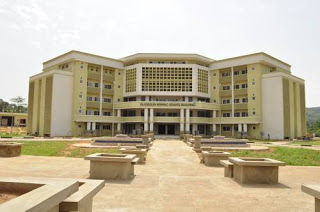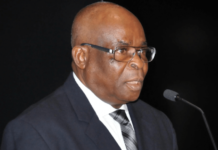occurrences, if properly handled. Every nation or corporate entity has
their own share of both at various times. Nations and entities that make
sense of boom are those who save for the rainy day and make good
investment decisions.

hard times are those which not only make unpopular but courageous
decisions but also put palliatives in place for citizens to cope with
the hard times. Either way, the people’s interests drive the decisions,
and they enjoy thereafter
Adekunle Ajasin University can be said to have applied these time-tested
principles during its good and challenging times. The university
applied the resources that accrued to it judiciously during the boom
period in the eight years precedent to 2015 by putting up unprecedented
structures, engaging in unparalleled capacity development and
cutting-edge researches including the university milestones, including
winning Best State University award in Nigeria in 2013.
Then came the period of sore economic crunch — a time the university’s
seven months’ subventions were not forthcoming from its proprietor, the
Ondo State Government owing to shortfall of resources from the Federal
Government; a time when the new government of Arakunrin Oluwarotimi
Akeredolu had to bend over backwards to net off part of the seven months
arrears of salaries it inherited from its predecessor and at the same
time strive to pay salaries due during his tenure; a time when staff
salaries had to be sourced from the savings of the university, contrary
to statutory provisions. Then came the sore point. The savings dried up,
government’s subventions nosedived to an abysmal level.
The Governing Council of the University, under the leadership of Dr.
Tunji Abayomi, engaged in an empirical analysis of the income and
expenditure of the University with a view to establishing a foolproof
basis for the requirements for a competitive university.
According to the findings of the Council, N500 is required to maintain
the 17,000 students per day, which translates to N15, 000 per student
per month and N180, 000 per student per annum.
According to figures released by the Pro Chancellor and Chairman of the
Governing Council, students’ expenses per annum stand at N3, 060, 000,
000; staff salary is 2, 640, 000,000, both totalling N5, 700, 000,000 or
N5.7 billion.
The Pro Chancellor says income from Government is N1.8b per annum.
Income from students (old regime) approximately is N5.5m per annum —
using an average of N30, 000 per student as the 17, 000 students pay
between N23, 000 and N34, 000. Income from other sources is
approximately N400m, and all these figures add up to approximately
N2.75b.
He said further, “When we looked at the total income for the University
and how much it spends in total, there is a huge difference of almost N3
billion.”
Council, in its wisdom, decided that it should share the N3 billion
shortfall with the students and the parents, with Council sourcing for
N1, 290, 000, 000 or N1.29 billion from grants, professorial chairs,
Foundations across the globe while the students (the beneficiaries) and
their parents should contribute N1, 700, 000, 000 or N1.7 billion in
form of school fees.
The N1.7 billion in form of the new school fees translates to the school
fees schedule as follows: Faculties of Arts and Education: Fresh
Students – N150, 000, Returning Students – N120,000; Faculties of
Science, Agriculture, Social and Management Sciences: Fresh Students –
N180, 000, Returning Students – N150, 000; and Faculty of Law: Fresh
Students – N200,000, Returning Students – N150, 000.
Dr. Abayomi had said in an interview with Orange 94.5 FM recently that
the students’ school fee was the baseline as, according to him,
government had shifted ground from its earlier stance to give the
university N1.5 billion subvention to the current N1.8 billion owing to
dwindling resources.
The point must be made that if the old student fee regime is maintained,
the university will groan under the burden of unpaid worker’s salaries,
inability to provide essential services — health, water, electricity,
examination materials, science and laboratory equipment — inability to
conduct research, and will have no option but to close down eventually.
That, obviously, is not an option. We all have a lesson to learn from a
sister university in the southwest whose experience with this option has
made it to close down for over one year.
Conscious of the harsh economic realities and determined to ensure that
no student drops out of school, Council and Management have resolved
that palliatives be put in place to cushion the effects of the
inevitable fee hike.
One of the palliatives being put in place by the Governing Council is to
establish the Students Support Centre that will handle grants and
endowment schemes and give opportunities to genuinely indigent students
to access bank loans.
The Pro-Chancellor, other members of Governing Council and Principal
Officers of the University have all shown their individual commitments
by pledging to contribute funds to the scheme.
Another incentive is the expansion of the Student Work-Study Centre of
the University to accommodate more students and upward review of the
stipend for willing and indigent students. The scheme, which took off in
July 2010, allows willing students to work for two hours daily and
receive a monthly stipend to support themselves financially while
studying in the University.
The Council has also graciously resolved to subsidize the fees payable by physically-challenged students substantially.
There is also the approval of payment by semester by students. Under
the arrangement, students can pay half of their total school fees per
semester.
The university management has engaged in an aggressive strategy to
elicit funds from philanthropists. Only three weeks ago, management was
able to obtain N20 million from a philanthropic Nigerian.
It is obvious from the above that the decision of Council and Management
to increase school fees was borne out of constraint orchestrated by
inevitable economic realities. There is, therefore, the need for all
well-meaning Nigerians, especially citizens of the state, to join hands
together to ensure that no AAUA student drops out of school and that the
dream of the founding fathers of the university to build a First Class
University is not extinct.
Imoru writes from the Information, Protocol and Public Relations Unit of Adekunle Ajasin University, Akungba Akoko











